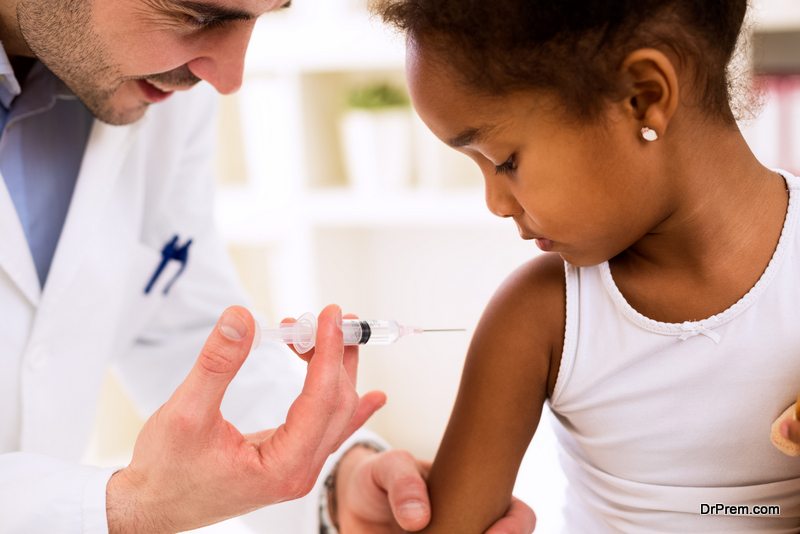Rare is the sight of a 3-year-old that is happy about getting a shot. Almost all doctor visits till the child turns four will be accompanied by a shot. Vaccines protect your little one from germs and boost their immune system, and hence form an important part of their growth. Frankly, shots don’t hurt that much. It is the phobia of needles that makes the problem seem larger than it is.
Fortunately, we can take steps to make it easier for the child. Here are a few things we can do to make this happen.
Avoid Shot Threats

To deal with needle phobia, we have to stop using the shot as a threat in daily life or when visiting the doctor for whatever reasons. A lot of people practice this where they say, “If you are not nice or don’t do a particular thing, I will take you to the doctor for a shot!”
Don’t lie
There’s no sense in saying it won’t hurt when you know it will. Instead tell them, “Yes, it will hurt but just for a few seconds”. The best practice is to not reveal too much. Being vague will work. If they ask if they will get a shot, tell them they might need one but you’re not sure they do. If you talk about the shot too much, the child may become more anxious and the child may end up becoming terrified of the doctor visit. If they are getting a shot and they know about it tell them “I know you’re scared but we will make it fast and easy”
Provide distraction

The slightest diversions can help pacify the child before the shot. You can make an older kid count, give them a toy, recite alphabets or blow bubbles if possible. Distractions can reduce anxiety and pain associated with shots. Toddlers can be distracted by singing or telling stories.
Try an anesthetic
Numbing the skin may help reduce the pain. One painless shot this time can make the next shot easier. You can try placing an ice cube on the skin for a few minutes before the shot. You can also buy skin anesthetics like EMLA cream, Buzzy. These creams block the nerves from sending pain signals to the brain and they are available over the counter. Numbing isn’t right for every child as the cold ice may hurt or the additional waiting after applying the cream may add to the child’s anxiety.
Use sweets

Sweets can be used as an oral distraction while getting a shot. Older kids can be give something they like but don’t usually get as a treat during vaccinations.
Make them sit up
Being asked to lie down flat can add to a child’s anxiety. A better option is to have them seated in a parent’s lap when they’re getting the shot.
A cough once before and after

For older kids, the coughing technique has shown to work again and again. Coughing once before and after the shot has shown to reduce pain in kids ranging from 4 to 12-year-olds. You can also ask the kid to blow air while getting the shot. You can ask them to imagine it as their birthday and they are blowing candles. This can also help reduce the pain associated with the shot.
Let go
Sometimes, the best way to get through the ordeal is to step back and let the professionals handle it. Let nurses and doctors take over and do their job. Doing so will help expedite the process reducing the painful experience for everyone involved.
Immediate relief

After a shot, have the child rest in your lap for a few minutes in case they feel dizzy or light-headed. If the vaccination causes swelling, you can apply an ice pack for 10 minutes. Although painkillers are not recommended, you can give them Children’s Motrin or Tylenol if the pain complain persists.
Offer rewards
A little incentive at the end of the session can help the kid acknowledge his bravery. You could also promise your child a trip to their favorite park or an ice cream cone.
Conclusion:
Children with unpleasant vaccination experiences grow up to be adults that don’t take their shots on time or avoid them completely. They may also be less likely to be blood donors and have a general fear of the needle. Hence, to make vaccinations a pleasant experience will help the baby through his/her life. Follow these tips to make it easier and also tell us about any others that you use.



